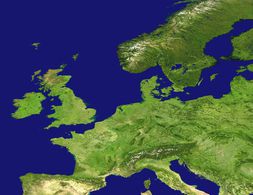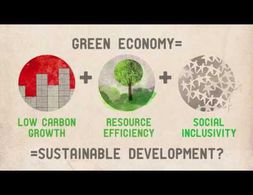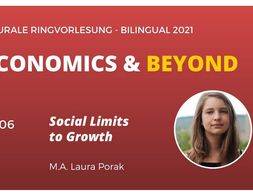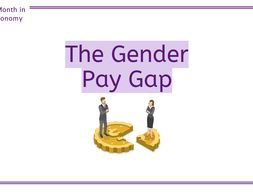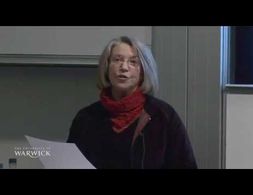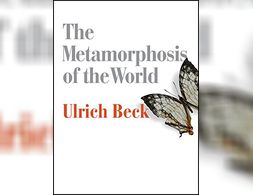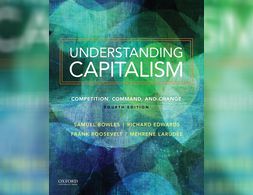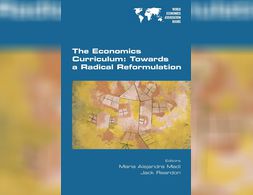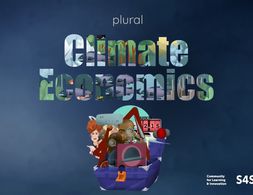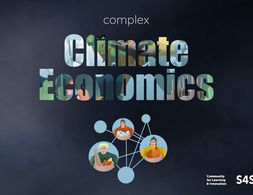✕
533 results
As part of a larger series on Just Transitions, the author describes how the current corona crisis comes with new economic policy responses which would have been considered unthinkable only a year ago. Arguing that with the current high levels of confidence in politicians and scientific advice, combined with the realisation that the market has not been able to solve this problem on its own, we are now in a unique position to implement a radically different solution than was politically possible previously.
What is sustainable development and what is the idea of a green economy? What is the role of the green economy in the current triple crisis? The short video discusses the concept and in particular the concerns about a green economy, especially with regards to inequality and poverty. The short statements in the video also reflect other possibilities of transformation.
A rethinking of the way to fight global poverty and winners of the Swedish Bank Prize for Economics.
Many economists refer to economic growth as a cake that is supposed to grow for the benefit of all.
Readers of economic and political theory as well as students of economic planning will appreciate this classic, now available for the first time in English. Written eighty years ago, when Sorel became disillusioned with the official socialism of the German and French Marxist parties, this new translation presents Sorel's analysis of the rise and fall of the two great modern ideologies: socialism and liberal capitalism.
This statistics and data analysis course will introduce you to the essential notions of probability and statistics We will cover techniques in modern data analysis estimation regression and econometrics prediction experimental design randomized control trials and A B testing machine learning and data visualization We will illustrate these concepts with …
The gender pay gap is a pressing issue that affects individuals and society as a whole, so it is important for economics students to understand it. Despite recent progress, women still earn less than men for the same jobs, leading to economic inequalities and reduced efficiency (see, for example, the recent report released by Moody’s). Understanding the causes and consequences of the gender pay gap is critical in developing policies that promote fairness and equality.
Recovery from the Covid-19 crisis provides a chance to implement economic measures that are also beneficial from environmental and social perspectives. While ‘green’ recovery packages are crucial to support economies tracking a low-carbon transition in the short-term, green measures such as carbon pricing are also key to improving welfare in the long-term. This commentary specifies the need for carbon pricing, outlines its implications for our everyday lives, and explains how it works alongside value-based change in the context of climate action and societal well-being.
Does Karl Polanyi's work “The Great Transformation” serve to analyse the current multiple crisis and social movements? Nancy Fraser revises Polanyi's concept of a double movement to capture social forces in the aftermath of the economic crisis of the 1930s – on the one side marketization and on the other hand social protection. Fraser proposes to talk about a triple movement and to account for emancipatory struggles. In the lecture, she discusses interactions as well as conflicts between those three forces, in particular conflicting aims of social protection. The lecture presents the content of her paper “A TRIPLE MOVEMENT? Parsing the Politics of Crisis after Polanyi“ in the New Left Review (2013).
On July 2020 ZOE-Institute published a unique platform for transformative policymaking: Sustainable Prosperity. Building on insights from new economic thinking the platform provides knowledge about ideas, arguments and procedures that support effective promotion of political change. It aims to strengthen change makers in public policy institutions, who are working on an ambitious green and just transition. As such, it provides convincing arguments and policy ideas to overcome the reliance of economic policy on GDP growth
In this essay the authors take a look at how welfare could be provided in a degrowth society.
We live in a world that is increasingly difficult to understand. It is not just changing: it is metamorphosing. Change implies that some things change but other things remain the same capitalism changes, but some aspects of capitalism remain as they always were. Metamorphosis implies a much more radical transformation in which the old certainties of modern society are falling away and something quite new is emerging.
Understanding Capitalism: Competition, Command, and Change is an introduction to economics that explains how capitalism works, why it sometimes fails, and how it undergoes and brings about change. It discusses both the conventional economic model and the role of power in economic interactions.
Stratification economics is defined as a systemic and empirically grounded approach to addressing intergroup inequality. Stratification economics integrates economics, sociology and social psychology to distinctively analyze inequality across groups that are socially differentiated, be it by race, ethnicity, gender, caste, sexuality, religion or any other social differentiation.
The volume has been conceived with current and future economics students in mind: they will be the economists of the future. One of the main ideas underlining the book is that "being an economist" in the XXI century requires a radical change in the training of economists and such change requires a global effort.
Can pluralism in economics be useful to tackle the fight against climate change? How can a diversity in methods and ideas allow for a better understanding of the issue of the climate crisis? What solutions do different schools of thought offer to overcome the most pressing challenge of the 21st Century? Our Rethinker Henrika Meyer will give you some answers and give you a glimpse of the solutions pluralism offers to tackle the fight against climate change.
Can pluralism in economics be useful to tackle the fight against climate change? How can diversity in methods and ideas allow for a better understanding of the issue of the climate crisis? What solutions do different schools of thought offer to overcome the most pressing challenge of the 21st Century? Our Rethinker Henrika Meyer will give you some answers and give you a glimpse of the solutions pluralism offers to tackle the fight against climate change.
Winner of the Nobel Prize in Economics
Get ready to change the way you think about economics.
Get ready to change the way you think about economics.
Nobel laureate Richard H. Thaler has spent his career studying the radical notion that the central agents in the economy are humans--predictable, error-prone individuals. Misbehaving is his arresting, frequently hilarious account of the struggle to bring an academic discipline back down to earth--and change the way we think about economics, ourselves, and our world.
The article pursues the two related questions of how economists pretend to know and why they want to know at all. It is argued that both the economic form of knowledge and the motivation of knowing have undergone a fundamental change during the course of the 20th century. The knowledge of important contemporary economic textbooks has little in common with an objective, decidedly scientifically motivated knowledge. Rather, their contents and forms follow a productive end, aiming at the subjectivity of their readers.
The Philosophy of Economics Foundational Text provides a systematic and well-structured overview over the field of philosophy of economics.
Aim of this intensive workshop is to understand macroeconomic workings of climate change as as the background of sustainable finance; to analyse financial assets with ESG (Environmental, Social and Governance) criteria attached to them and their markets and important institutional players; to develop a critical perspective on the current setup of sustainable finance; and to synthesise this knowledge by applying it on in-depth case studies.
How did the coronavirus almost bring down the Global Financial System? What effects does monetary policy have on inequality? What role do Central Banks have in the social-ecological transformation? How could Central Banks tackle climate change? What is Central Bank Digital Currency?
The global financial crisis (GFC) led to increasing distrust in economic research and the economics profession, in the process of which the current state of economics and economic education in particular were heavily criticized. Against this background we conducted a study with undergraduate students of economics in order to capture their view of economic education.
Transition from central planning to a market economy, involving large-scale institutional change and reforms at all levels, is often described as the greatest social science experiment in modern times.
This paper investigates how the concept of public purpose is used in Modern Monetary Theory (MMT). As a common denominator among political scientists, the idea of public purpose is that economic actions should aim at benefiting the majority of the society. However, the concept is to be considered as an ideal of a vague nature, which is highly dependent on societal context and, hence, subject to change over time. MMT stresses that government spending plans should be designed to pursue a certain socio-economic mandate and not to meet any particular financial outcome. The concept of public purpose is heavily used in this theoretical body of thought and often referred to in the context of policy proposals as the ideas of universal job guarantee and banking reform proposals show. MMT scholars use the concept as a pragmatic benchmark against which policies can be assessed. With regards to the definition of public propose, MMT scholars agree that it is dependent on the social-cultural context. Nevertheless, MMT scholars view universal access to material means of survival as universally applicable and in that sense as the lowest possible common denominator.
Marxian Political Economy focuses on the exploitation of labour by capital. The economy is not conceived as consisting of neutral transactions for exchange and cooperation, but instead as having developed historically out of asymmetric distributions of power, ideology and social conflicts.
This course provides future change makers in public and private sectors with a comprehensive overview on the structures and actors that shape markets.
What are the implications of the politics of "behavioural change"? Alexander Feldmann took a closer look for you on nudging and framing and if this is a legitimate instrument being used by the state to make us behave better in terms of our carbon footprint.
Deforestation is estimated to be responsible for about 12-29% of global greenhouse gas emissions. This essay will explore ecological economics as an alternative lens through which to approach forest conservation and the acceleration of climate change.
This article outlines the fundamental challenges of democratically planned economies and categorises proposed models into six groups, each of which approaches planning and coordination at different levels of authority and between myriad economic units in a particular way, taking into account efficiency as well as democratic principles and environmental and social sustainability. Through a classification system based on decision-making authority and mediation mechanisms, the article provides a framework for understanding and comparing these models. By examining their different approaches, it offers insights into the complexities and potential paths of democratically planned economies in the 21st century.
The goal of the class is to acquire familiarity with recently-published research in alternative macroeconomics with a focus on the distribution of income and wealth, cyclical growth models, and technical change.
Is or has economics ever been the imperial social science? Could or should it ever be so? These are the central concerns of this book. It involves a critical reflection on the process of how economics became the way it is, in terms of a narrow and intolerant orthodoxy, that has, nonetheless, increasingly directed its attention to appropriating the subject matter of other social sciences through the process termed "economics imperialism".
We use cookies on our website. Click on Accept to help us to make Exploring Economics constantly better!

